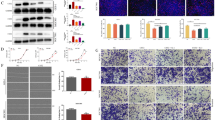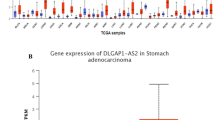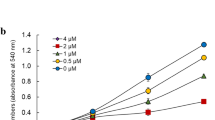Abstract
Genistein, a major isoflavone constituent in soybeans, has been reported to exhibit multiple anti-tumor effects, such as inducing cell cycle arrest, triggering apoptosis, and inactivating critical signaling pathways in a few human cancer cells. Here, we investigated the anti-tumor effects of genistein on the small-cell lung cancer (SCLC) cell line H446 and the underlying molecular mechanisms. H446 cells were treated with various concentrations of genistein, and experiments including CCK-8 assay, colony formation assay, flow cytometry analysis, wound healing assay, real-time polymerase chain reaction (PCR), western blot analysis, and plasmid transfection were used to investigate the influence of genistein on cell proliferation, migration ability, apoptosis, cell cycle progression, as well as the mRNA and protein alterations of FoxM1 pathway molecules. We found that genistein significantly inhibited the proliferation and migration ability of H446 cell, accompanied by apoptosis and G2/M phase cell cycle arrest. In addition, genistein enhanced the anti-proliferative effect of cisplatin on H446 cells. Importantly, genistein led to attenuation of the FoxM1 protein and down-regulated a series of FoxM1 target genes regulating cell cycle and apoptosis including Cdc25B, cyclin B1, and survivin. In addition, up-regulation of FoxM1 by cDNA transfection prior to genistein treatment could reduce genistein-induced H446 proliferation inhibition. Thus, for the first time, we demonstrated that genistein exerted multiple anti-tumor effects in H446 SCLC cell line at least partly mediated by the down-regulation of FoxM1. FoxM1 has the potential as a novel therapeutic agent in SCLC and is worthy of further study.






Similar content being viewed by others
References
Jemal A, Bray F, Center MM, Ferlay J, Ward E, Forman D. Global cancer statistics. CA Cancer J Clin. 2011;61:69–90.
Sher T, Dy GK, Adjei AA. Small cell lung cancer. Mayo Clin Proc. 2008;83:355–67.
Lampe JW, Nishino Y, Ray RM, Wu C, Li W, Lin MG. Plasma isoflavones and fibrocystic breast conditions and breast cancer among women in shanghai, china. Cancer Epidemiol Biomarkers Prev. 2007;16:2579–86.
Kurahashi N, Iwasaki M, Sasazuki S, Otani T, Inoue M, Tsugane S. Soy product and isoflavone consumption in relation to prostate cancer in Japanese men. Cancer Epidemiol Biomarkers Prev. 2007;16:538–45.
Li Q, Chen H. Epigenetic modifications of metastasis suppressor genes in colon cancer metastasis. Epigenetics. 2011;6:849–52.
Sarkar FH, Li Y. The role of isoflavones in cancer chemoprevention. Front Biosci. 2004;9:2714–24.
Zhang Y, Li Q, Zhou D, Chen H. Genistein, a soya isoflavone, prevents azoxymethane-induced up-regulation of wnt/beta-catenin signalling and reduces colon pre-neoplasia in rats. Br J Nutr. 2013;109:33–42.
Gadgeel SM, Ali S, Philip PA, Wozniak A, Sarkar FH. Genistein enhances the effect of epidermal growth factor receptor tyrosine kinase inhibitors and inhibits nuclear factor kappa b in nonsmall cell lung cancer cell lines. Cancer. 2009;115:2165–76.
Yamasaki M, Mine Y, Nishimura M, Fujita S, Sakakibara Y, Suiko M, et al. Genistein induces apoptotic cell death associated with inhibition of the nf-kappab pathway in adult t-cell leukemia cells. Cell Biol Int. 2013;37:742–7.
Li Y, Che M, Bhagat S, Ellis KL, Kucuk O, Doerge DR, et al. Regulation of gene expression and inhibition of experimental prostate cancer bone metastasis by dietary genistein. Neoplasia. 2004;6:354–63.
Liang C, Li H, Shen C, Lai J, Shi Z, Liu B, et al. Genistein potentiates the anti-cancer effects of gemcitabine in human osteosarcoma via the downregulation of akt and nuclear factor-kappab pathway. Anticancer Agents Med Chem. 2012;12:554–63.
Lattrich C, Lubig J, Springwald A, Goerse R, Ortmann O, Treeck O. Additive effects of trastuzumab and genistein on human breast cancer cells. Anticancer Drugs. 2011;22:253–61.
Banerjee S, Zhang Y, Ali S, Bhuiyan M, Wang Z, Chiao PJ, et al. Molecular evidence for increased antitumor activity of gemcitabine by genistein in vitro and in vivo using an orthotopic model of pancreatic cancer. Cancer Res. 2005;65:9064–72.
Shimazu T, Inoue M, Sasazuki S, Iwasaki M, Sawada N, Yamaji T, et al. Plasma isoflavones and the risk of lung cancer in women: a nested case-control study in Japan. Cancer Epidemiol Biomarkers Prev. 2011;20:419–27.
Kuiper GG, Lemmen JG, Carlsson B, Corton JC, Safe SH, van der Saag PT, et al. Interaction of estrogenic chemicals and phytoestrogens with estrogen receptor beta. Endocrinology. 1998;139:4252–63.
Zhou Y, Lee AS. Mechanism for the suppression of the mammalian stress response by genistein, an anticancer phytoestrogen from soy. J Natl Cancer Inst. 1998;90:381–8.
Akiyama T, Ishida J, Nakagawa S, Ogawara H, Watanabe S, Itoh N, et al. Genistein, a specific inhibitor of tyrosine-specific protein kinases. J Biol Chem. 1987;262:5592–5.
Li Y, Sarkar FH. Inhibition of nuclear factor kappab activation in pc3 cells by genistein is mediated via akt signaling pathway. Clin Cancer Res. 2002;8:2369–77.
Wang Z, Ahmad A, Banerjee S, Azmi A, Kong D, Li Y, et al. Foxm1 is a novel target of a natural agent in pancreatic cancer. Pharm Res. 2010;27:1159–68.
Korver W, Roose J, Clevers H. The winged-helix transcription factor trident is expressed in cycling cells. Nucleic Acids Res. 1997;25:1715–9.
Wang IC, Chen YJ, Hughes D, Petrovic V, Major ML, Park HJ, et al. Forkhead box m1 regulates the transcriptional network of genes essential for mitotic progression and genes encoding the scf (skp2-cks1) ubiquitin ligase. Mol Cell Biol. 2005;25:10875–94.
Green MR, Aya-Bonilla C, Gandhi MK, Lea RA, Wellwood J, Wood P, et al. Integrative genomic profiling reveals conserved genetic mechanisms for tumorigenesis in common entities of non-hodgkin's lymphoma. Gene Chromosome Cancer. 2011;50:313–26.
Uddin S, Ahmed M, Hussain A, Abubaker J, Al-Sanea N, AbdulJabbar A, et al. Genome-wide expression analysis of middle eastern colorectal cancer reveals foxm1 as a novel target for cancer therapy. Am J Pathol. 2011;178:537–47.
Li Q, Zhang N, Jia Z, Le X, Dai B, Wei D, et al. Critical role and regulation of transcription factor foxm1 in human gastric cancer angiogenesis and progression. Cancer Res. 2009;69:3501–9.
Ahmad A, Wang Z, Kong D, Ali S, Li Y, Banerjee S, et al. Foxm1 down-regulation leads to inhibition of proliferation, migration and invasion of breast cancer cells through the modulation of extra-cellular matrix degrading factors. Breast Cancer Res Treat. 2010;122:337–46.
Zhang N, Wei P, Gong A, Chiu WT, Lee HT, Colman H, et al. Foxm1 promotes beta-catenin nuclear localization and controls wnt target-gene expression and glioma tumorigenesis. Cancer Cell. 2011;20:427–42.
Wang Z, Banerjee S, Kong D, Li Y, Sarkar FH. Down-regulation of forkhead box m1 transcription factor leads to the inhibition of invasion and angiogenesis of pancreatic cancer cells. Cancer Res. 2007;67:8293–300.
Kastan MB, Bartek J. Cell-cycle checkpoints and cancer. Nature. 2004;432:316–23.
Kasibhatla S, Tseng B. Why target apoptosis in cancer treatment? Mol Cancer Ther. 2003;2:573–80.
Laoukili J, Kooistra MR, Bras A, Kauw J, Kerkhoven RM, Morrison A, et al. Foxm1 is required for execution of the mitotic programme and chromosome stability. Nat Cell Biol. 2005;7:126–36.
Rhodes DR, Yu J, Shanker K, Deshpande N, Varambally R, Ghosh D, et al. Large-scale meta-analysis of cancer microarray data identifies common transcriptional profiles of neoplastic transformation and progression. Proc Natl Acad Sci U S A. 2004;101:9309–14.
Pilarsky C, Wenzig M, Specht T, Saeger HD, Grutzmann R. Identification and validation of commonly overexpressed genes in solid tumors by comparison of microarray data. Neoplasia. 2004;6:744–50.
Park HJ, Gusarova G, Wang Z, Carr JR, Li J, Kim KH, et al. Deregulation of foxm1b leads to tumour metastasis. EMBO Mol Med. 2011;3:21–34.
Zhang Y, Zhang N, Dai B, Liu M, Sawaya R, Xie K, et al. Foxm1b transcriptionally regulates vascular endothelial growth factor expression and promotes the angiogenesis and growth of glioma cells. Cancer Res. 2008;68:8733–42.
Dai B, Kang SH, Gong W, Liu M, Aldape KD, Sawaya R, et al. Aberrant foxm1b expression increases matrix metalloproteinase-2 transcription and enhances the invasion of glioma cells. Oncogene. 2007;26:6212–9.
Yu J, Deshmukh H, Payton JE, Dunham C, Scheithauer BW, Tihan T, et al. Array-based comparative genomic hybridization identifies cdk4 and foxm1 alterations as independent predictors of survival in malignant peripheral nerve sheath tumor. Clin Cancer Res. 2011;17:1924–34.
Priller M, Poschl J, Abrao L, von Bueren AO, Cho YJ, Rutkowski S, et al. Expression of foxm1 is required for the proliferation of medulloblastoma cells and indicates worse survival of patients. Clin Cancer Res. 2011;17:6791–801.
Hui MK, Chan KW, Luk JM, Lee NP, Chung Y, Cheung LC, et al. Cytoplasmic forkhead box m1 (foxm1) in esophageal squamous cell carcinoma significantly correlates with pathological disease stage. World J Surg. 2012;36:90–7.
Acknowledgments
This study was funded by the Science and Technology Development Projects of Shandong Province of China (2012GSF11845), Science and Technology Development Projects of Jinan City of Shandong Province (JN100503), Independent Innovation Foundation of Shandong University (2012TS155), and National Natural Science Foundation of China (81372530, 81201934).
Conflicts of interest
None
Author information
Authors and Affiliations
Corresponding author
Additional information
Tiantian Tian and Jisheng Li contributed equally to this work.
Rights and permissions
About this article
Cite this article
Tian, T., Li, J., Li, B. et al. Genistein exhibits anti-cancer effects via down-regulating FoxM1 in H446 small-cell lung cancer cells. Tumor Biol. 35, 4137–4145 (2014). https://doi.org/10.1007/s13277-013-1542-0
Received:
Accepted:
Published:
Issue Date:
DOI: https://doi.org/10.1007/s13277-013-1542-0




